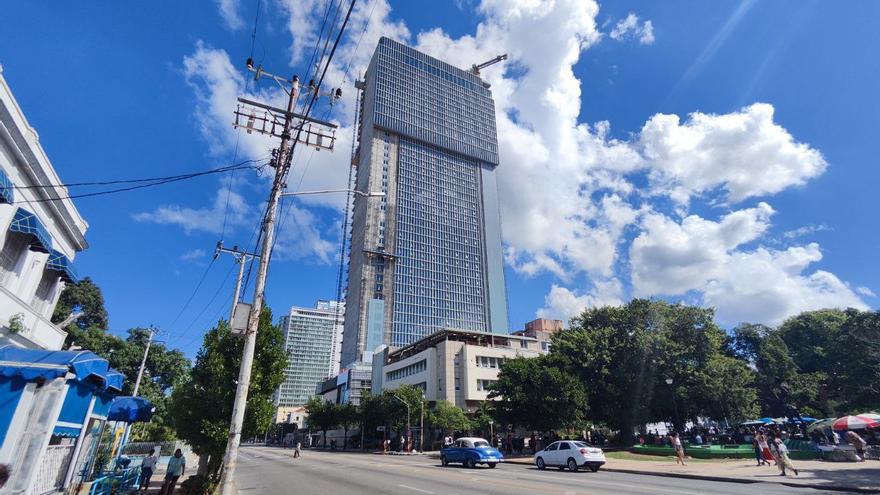
![]() 14ymedio, Havana, December 7, 2023 — The Spanish advisor Francisco Albertí, who has been the financial guru for almost all the large hotel groups in Spain, this Thursday asked the Cuban authorities to allow the companies, “especially Meliá, to be great actors and advisors of the Cuban Government in the tourist recovery,” suggesting, even, that they could own some of the hotels they manage.
14ymedio, Havana, December 7, 2023 — The Spanish advisor Francisco Albertí, who has been the financial guru for almost all the large hotel groups in Spain, this Thursday asked the Cuban authorities to allow the companies, “especially Meliá, to be great actors and advisors of the Cuban Government in the tourist recovery,” suggesting, even, that they could own some of the hotels they manage.
With experience working not only for Meliá, but also for the Mallorcan Iberostar and Riu – all with a history of hotel management on the Island – the expert does not make his proposal in vain. The business, he insinuates, would be good.
Even better, the hotel chains could help oxygenate with “private investment all the sectors that suffer: energy, supplies, food, agriculture and livestock,” which are “paralyzed” by the crisis on the Island.
To do this, he clarifies, the first step must be taken by the Cuban government, which will have to “open the country a little more” so that Spanish companies stop being simple managers and become owners of their hotels on the Island.
“Now is the time for Cuba to make important decisions at the tourist and country level” if it wants to “get back on its feet”
“Now is the time for Cuba to make important decisions at the tourist and country level” if it wants to “get back on its feet,” says Albertí. The tourism advisor also recalled the years in which he worked as an expansion director for the Riu chain, which in 2008 left the last of the three hotels that it once operated in Cuba. “Investing was not allowed for Spanish hoteliers, and the Riu family opted for another model,” he said.
The expansion plan launched later in countries such as Mexico, Jamaica and Costa Rica suggests that the hotel company stopped seeing Cuba as an enclave of interest and began to bet on nearby destinations.
“At that time they had hotels under management and for rent even in Spain. There was no more motivation so they left the Island,” Albertí reflects, insinuating perhaps that the same could happen with Meliá or Iberostar, which he described as “hoteliers who have supported the tourism industry” despite the fact that other destinations provide them with better results.
The intentions of both chains, however, seem to be directed at the moment in the opposite direction. This year Meliá inaugurated two luxury hotels in Varadero (Matanzas) and Sancti Spíritus. The latter, the Meliá Trinidad Península, has been the center of several controversies for its exclusive facilities that captured 60% of the province’s annual budget granted by the Ministry of Construction.
The hotel company also plans to inaugurate three other facilities in central areas of Havana: the Innside Habana Catedral, the Plaza de La Habana and the Seville
The hotel company also plans to inaugurate three other facilities in central areas of Havana – the Innside Habana Catedral, the Plaza de La Habana and the Seville – in addition to a fourth in Holguín, the Sol Turquesa Beach. At the end of the year, the chain will have 34 establishments throughout the island. Iberostar, lagging behind, is trying to reach thirty and will manage the Torre K hotel in the capital, currently under construction and without a name.
Likewise, last May, Gabriel Escarrer, vice president of Meliá, assured that despite the fall in tourism after the pandemic, he has no doubt that Cuba “will recover pre-crisis levels and will be in better condition than ever.” The director also said he had faith that the Island would reach the 3.5 million travelers predicted by the Cuban authorities, something that did not happen. On the contrary, at the end of November the figure did not reach even 2 million.
European tourism has been one of the most affected, which the Island’s authorities attribute to the war in Ukraine. The statistics of the sector, although better than in 2022, do not compare to the more than 4 million travelers who flew to Cuba in the years prior to COVID-19.
The Government, for its part, has tried to counteract the debacle by promoting Russian and Chinese tourism, but so far neither of the two alternatives has shown the results that Havana expected.
Translated by Regina Anavy
____________
COLLABORATE WITH OUR WORK: The 14ymedio team is committed to practicing serious journalism that reflects Cuba’s reality in all its depth. Thank you for joining us on this long journey. We invite you to continue supporting us by becoming a member of 14ymedio now. Together we can continue transforming journalism in Cuba.
